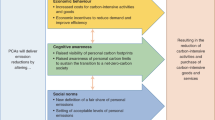Abstract
National carbon budgets provide transparency and accountability to international climate change mitigation efforts, but are merely notional at the individual level, providing little guidance for reducing personal carbon footprints. This chapter examines personal carbon trading, budgeting carbon emissions from energy and transport at the individual level, and considers several ethics issues related to the scheme that have also been applied to cap and trade systems at the national level. Despite its limitations, personal carbon trading can hold individuals responsible for their polluting behavior, be designed to reflect normative commitments to equity in climate ethics, and help raise awareness about climate change and social decarbonization efforts through effective personal mitigation actions.
Access this chapter
Tax calculation will be finalised at checkout
Purchases are for personal use only
Similar content being viewed by others
References
Aldred, J. (2012). The ethics of emissions trading. New Political Economy, 17(3), 339–360.
Broome, J. (2012). Climate matters: Ethics in a warming world. New York: W. W. Norton.
Bumpus, A., & Liverman, D. (2008). Accumulation by decarbonization and the governance of carbon offsets. Economic Geography, 84(2), 127–155.
Caney, S. (2010). Markets, morality and climate change: What, if anything, is wrong with emissions trading? New Political Economy, 15(2), 197–224.
Caney, S., & Hepburn, C. (2011). Carbon trading: Unethical, unjust, and ineffective? Royal Institute of Philosophy Supplement, 69, 201–234.
Castree, N. (2003). Commodifying what nature? Progress in Human Geography, 27(3), 273–297.
Dobson, A. (2006). Thick cosmopolitanism. Political Studies, 54(1), 165–184.
Fawcett, T. (2010). Personal carbon trading: A policy ahead of its time? Energy Policy, 38, 6868–6876.
Fleming, D. (2007). Energy and the common purpose. London: The Lean Economy Connection. Available at http://www.teqs.net/book/teqs.pdf.
Harvey, D. (2007). Neoliberalism as creative destruction. The ANNALS of the American Academy of Political Science, 610, 22–44.
Hyams, K. (2009). A just response to climate change: Personal carbon allowances and the normal-functioning approach. Journal of Social Philosophy, 40(2), 237–256.
Keohane, R. O. (2006). Accountability in world politics. Scandinavian Political Studies, 29, 75–87.
Kosoy, N., & Corbera, E. (2010). Payments for ecosystem services as commodity fetishism. Ecological Economics, 69, 1228–1236.
Miller, D. (2001). Distributing responsibilities. The Journal of Political Philosophy, 9(4), 453–471.
Miller, D. (2008). Global justice and climate change: How should responsibilities be distributed? The Tanner Lectures on Human Values, 28, 117–156.
Page, E. (2011). Cashing in on climate change: Political theory and global emissions trading. Critical Review of International Social and Political Philosophy, 14(2), 259–279.
Parag, Y., & Strickland, D. (2010). Personal carbon trading: A radical policy option for reducing emissions from the domestic sector. Environment: Science and Policy for Sustainable Development, 53(1), 29–37.
Sagoff, M. (2002). Controlling global climate: The debate over pollution trading. In V. V. Gehring & W. A. Galston (Eds.), Philosophical dimensions of public policy (pp. 311–318). New Brunswick, NJ: Transaction.
Sandel, M. (2005). Should we buy the right to pollute? Public philosophy: Essays on morality in politics (pp. 93–96). Cambridge, MA: Harvard University Press.
Spiekermann, K. (2014). Buying low, flying high: Carbon offsets and partial compliance. Political Studies, 62(4), 913–929.
United Nations. (1992). United Nations Framework Convention on Climate. Available at https://unfccc.int/resource/docs/convkp/conveng.pdf.
United Nations Framework Convention on Climate Change. (2001a). Decision 15/CP.7: Principles, nature and scope of the mechanisms pursuant to Articles 6, 12 and 17 of the Kyoto Protocol. Available at http://cdm.unfccc.int/EB/rules/modproced.html.
United Nations Framework Convention on Climate Change. (2001b). The Marrakesh accords & Marrakesh declaration. Available at https://unfccc.int/cop7/documents/accords_draft.pdf.
Author information
Authors and Affiliations
Corresponding author
Editor information
Editors and Affiliations
Rights and permissions
Copyright information
© 2019 The Author(s)
About this chapter
Cite this chapter
Vanderheiden, S. (2019). Personal Carbon Trading and Individual Mitigation Accountability. In: Edmondson, B., Levy, S. (eds) Transformative Climates and Accountable Governance. Palgrave Studies in Environmental Transformation, Transition and Accountability. Palgrave Macmillan, Cham. https://doi.org/10.1007/978-3-319-97400-2_12
Download citation
DOI: https://doi.org/10.1007/978-3-319-97400-2_12
Published:
Publisher Name: Palgrave Macmillan, Cham
Print ISBN: 978-3-319-97399-9
Online ISBN: 978-3-319-97400-2
eBook Packages: Social SciencesSocial Sciences (R0)




